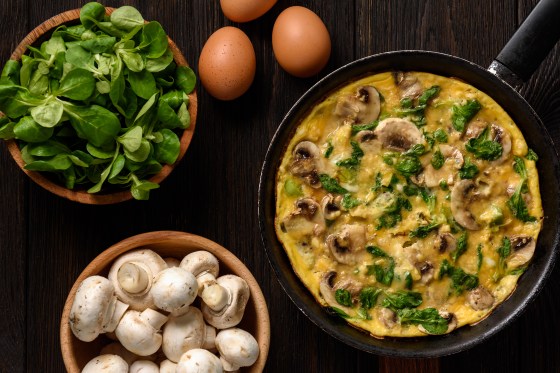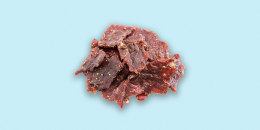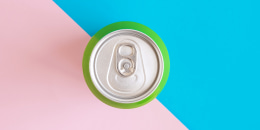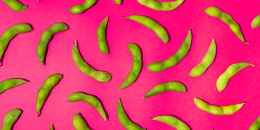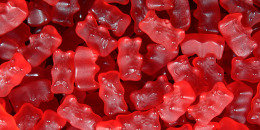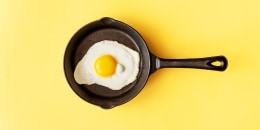Protein is one of the major macronutrients that we need every day, along with fat and carbohydrates. So, if you're cutting back on carbs, then you'll need to up your intake of high-protein, low-carb foods to stay full, energized and satisfied.
Thankfully, protein is in poultry, dairy and fish, as well as vegetarian sources, like soy, legumes, nuts and seeds. You can also find smaller amounts of protein in some vegetables, fruits and whole grains, too.
We need protein for basic functioning, including cell maintenance and repair, the production of antibodies and blood clotting. Protein is also a primary component of tissues like muscle, skin and hair.
Since our bodies digest protein more slowly than carbohydrates, a high-protein diet can keep you feeling full for longer periods of time. Protein can also boost your bone density, and promote weight management. Getting protein from healthy source that are low in saturated fat can also lend to improved cardiovascular health and reduced levels of "bad" LDL cholesterol. It can also regulate blood sugar levels.
According to Mayo Clinic, protein should account for 10-35% of your total calories. So that means if you're eating 2,000 calories a day, you should try to get 200-700 calories from protein, or about 50-175 grams. You can also calculate your protein needs based on your body weight — 0.8 grams per kilogram. If you weigh 165 pounds, that's about 75 kilos, so about 60 grams of protein a day.
So if you're in search of some high-protein, low-carb foods, check out some of my favorites, as a registered dietitian, below:
Almonds
One of the healthiest nuts you can eat, just one cup of whole almonds contains 30.3 grams of protein. They also have heart-healthy fats that are good for gut health and anti-inflammatory effects. They are also high in antioxidants, and may reduce heart disease risk since they lower cholesterol.
Black beans
Black beans contain some carbs, but they also provide a good amount of plant-based protein and gut-healthy fiber. They’re also jam-packed with phytonutrients, including antioxidants like anthocyanins and quercetin. Just a half-cup serving contains 7.5 grams of protein, 7.5 grams of fiber and 20 grams of carbs.
Cauliflower
One medium-sized head of cauliflower contains about 11 grams of protein. One cup raw has about 2 grams. Cauliflower is also rich in fiber, making it even more likely to keep you satisfied for longer periods, antioxidants, which have cancer-fighting properties, and choline, which prevents the liver from trapping cholesterol.
Chicken
A lean go-to protein source for good reason, a 4-ounce serving of chicken will give you a whopping 26 grams of protein for a minimal 120 calories without any carbs. Try chicken as a salad topping, soup ingredient, stir-fry protein and more.
Chickpeas
These little legumes are a great addition to soups and salads, especially if you’re trying to reduce your intake of animal protein. Try roasting them with your favorite seasonings for a quick, crunchy snack. They may be higher in carbs than other protein options, but they are also packed with tons of fiber and antioxidants. Chickpeas contain about 7 to 9 grams of protein per half-cup serving and 20 grams of carbs.
Cod
A single fillet of cod contains 41 grams of protein and zero grams of carbs. This flaky white fish is also high in vitamin B12, which is beneficial for blood and nervous system health and DNA synthesis. Cod also contains some vitamin C, D and iron. It's a popular choice for fish and chips and fish tacos.
Cottage cheese
A half-cup serving of cottage cheese contains about 100 calories, 12 grams of protein and 5 grams of carbs. It a versatile ingredient that can be used as the base for a sweet or savory dish, and makes a great dip for veggies.
Edamame
A common appetizer at Japanese restaurants, edamame refers to immature soybeans still in their pod. The preparation is simple: boil in the pods and then cool and add salt if desired. Edamame contains 17 grams of protein in 1 cup, and are high in vitamin C, calcium, iron and folic acid.
Eggs
Eggs are an easy, nutrient-dense and inexpensive way to pack in protein, as well as a dose of fat, with trace amounts of carbohydrates. With 6 grams of protein per egg, you can easily get your protein through a simple, healthy two-egg breakfast with sautéed greens.
Grass-fed beef
Grass-fed and free-range means that the meat comes from cows that graze freely on grass for their entire lives. This kind of beef is the best choice, because of a healthier fat profile and more antioxidants. Grass-fed beef contains two to three times the amount of conjugated linoleic acids (CLAs) compared to grain-finished beef. CLAs are healthy fats associated with reduced cancer risk, reduced cardiovascular disease risk, and better cholesterol levels. This beef has 22 grams of protein and no carbohydrates for a 4-ounce serving.
Hemp seeds
Hemp seeds are simple and nutritious addition to a smoothie or oatmeal. It's hard to find as much nutrient density in a single food as you can find in hemp seeds. Just 3 tablespoons contain about 160 calories, 10 grams of protein, 240 milligrams of potassium and 15-20% of your daily iron needs (depending on the brand). Hemp has common omega-3 and omega-6 fatty acids, but it is also loaded with the less commonly found stearidonic acid (SDA) and gamma linoleic acid (GLA). You need these fatty acids to fight inflammation and protect your heart and immune system.
Lentils
Lentils are a no-brainer for those looking to up their plant-protein consumption (which really should be all of us). Unlike animal proteins that deliver saturated fat — the type of fat that can raise our "bad" LDL cholesterol — plant-based proteins like lentils are free of saturated fat. Again, this option is higher in carbohydrates but also dietary fiber, which is critical for stabilizing blood-sugar levels, as well as lowering LDL cholesterol. A 1-cup serving of cooked lentils will provide 18 grams of protein with 40 grams of carbs.
Peanut butter
Nut butter is a delicious ingredient or standalone food in so many different contexts. Whether you’re a peanut butter lover, an almond butter addict or a cashew connoisseur, opt for natural nut butters made from just one ingredient: nuts! One 2-tablespoon serving puts about 8 grams of protein on your plate with 6 grams of carbs.
Pork tenderloin
When consumed in moderation, pork tenderloin, a lean cut lower in fat than others, can be a healthy, low-carb protein to add to your diet. A 3-ounce serving has 22 grams of protein. Pork also contains vitamin B12 and B6, iron and zinc. It’s also high in selenium, which contains antioxidants. If you’re buying a tenderloin in the store, try to avoid pre-seasoned ones as they usually are high in sodium.
Pumpkin seeds
Pumpkin seeds are a nutrient-packed ingredient to use all year long — not just after you carve a pumpkin! These small but mighty seeds pack in 9 grams of protein in a 1-ounce serving and also contain important minerals, such as zinc, magnesium and iron. (In fact, pumpkin seed protein contains more magnesium than other popular plant-based protein powders, like whey and soy.) They are also are a good source of healthy fats and add a nice crunch to just about any dish for only 4 grams of carbs per shelled serving.
Salmon
This fish is a delicious source of omega-3s (important for your metabolism) and protein, with about 17 grams per 3-ounce serving and no carbohydrates. When purchasing salmon, make sure you opt for the wild-caught variety. It’s sustainable and can actually provide more nutritional benefit than farm-raised options. Salmon is also a protein source that can be quick and easy to get on the table on a hectic weeknight with a recipe like this parchment-baked salmon.
Sardines
Sardines are a type of small fish often packaged in a tin, one of which contains about 23 grams of protein. Sardines are also high in vitamin B12, vitamin D and calcium, and a serving will get you most or all of the way toward your daily goal for omega-3 fatty acids, which protect against heart disease and boost brain health. These little fish can also help improve good cholesterol levels. Try grilling them or roasting them.
Shrimp
Keeping a bag of shrimp in your freezer is an easy way to add some protein to any meal, as they defrost easily and cook fast. (Buying them frozen also means they’re preserved at the peak of their freshness, instead of buying them thawed.) Unlike other seafood, shrimp is low in mercury. It also boosts good cholesterol because has high omega-3 fatty acid content and low saturated fat.
Spirulina
This green algae is popular with wellness advocate and for good reason. Gram-for-gram, spirulina may be the single most nutritious food on the planet. The quality of the protein in spirulina is considered comparable to eggs. It contains all the essential amino acids that you need: 4 grams in a tablespoon of dried spirulina (and less than 2 grams of carbs). It has a strong flavor, so mask it in a smoothie — it also adds a fun blue hue!
Sunflower seeds
Sunflower seeds’ high fiber and protein content make them an excellent on-the-go snack that will keep you full for a while. They contain 29 grams of protein in a 1-cup serving. Studies have shown that consuming sunflower seeds is associated with a reduction in heart disease risk, as well as lowering of cholesterol and blood pressure.
Tempeh
Not only is tempeh a source of gut-friendly probiotics, but it’s also packed with plant-based protein. Try experimenting with new meal options, like a tempeh breakfast hash, tempeh bacon or tempeh stir-fry. Not familiar with the ingredient? Check out this guide to tempeh. You’ll get about 15 grams of protein and 13 grams of carbs in a 4-ounce serving.
Tofu
Tofu is a great vegetarian source of protein, but you don't have to be vegetarian to enjoy it. In particular, I love sautéing crumbled tofu with colorful veggies such as bell peppers, onions and spinach for a high-protein, egg-free breakfast. Don’t forget to add flavor your tofu with spices such as turmeric, black pepper, cumin and garlic. Tofu contains about 20 grams of protein and less than 4 grams of carbs in a half-cup serving.
Tuna
Tuna delivers zero carbs per serving and 24 grams of protein in a 3-ounce serving, so safe to say that it’s a high-protein, low-carb fish. It’s also an excellent source of vitamins B12 and B6, as well as vitamin D. It’s high in omega-3 fatty acids, too, which can help lower LDL cholesterol, reducing risk of cardiovascular disease and possibly even boosting eye health, research shows.
Walnuts
One cup of ground walnuts contains about 12 grams of protein. They're also considered low in carbs but high in many important nutrients, like B vitamins, iron, magnesium, zinc, fiber and heart-healthy fats. Top salads and other dishes with walnuts or eat them as snack.
Yogurt
All yogurt will give you a good amount of protein. But some types of yogurt, particularly strained options like Greek yogurt and Icelandic skyr, will give you an even bigger boost. Opt for an unsweetened version to avoid added sugars, then incorporate your own natural sweeteners, like fresh fruit and cinnamon. Or, for even more protein, top yours with a sprinkling of nuts and seeds. You’ll get more than 15 grams of protein and 5 grams of carbs per three-quarter-cup serving, depending on the brand.
